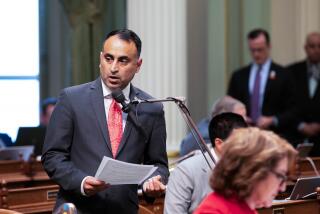Doctor Links Health Care to More Taxes
If the public wants to continue receiving quality health care, politicians will “have to do the unthinkable; ask people to pay more taxes,” according to a physician who is also a prominent health-care authority.
Dr. Arnold Relman, editor of the prestigious New England Journal of Medicine and a Harvard Medical School professor, warned Monday at a national health care conference in Costa Mesa that “catastrophe” will follow unless government eventually imposes some regulations on the industry.
“I am not talking about socialism,” Relman said. “That will never happen here in a hundred years.” However, he said he does see the necessity for “a broad tax base” to support soaring health-care costs.
“I think that ultimately the political climate will change. What is unthinkable now, what causes some politicians to quake with fear is that people will be asked to pay more taxes. Cost is going to go up unless we make some political changes that we don’t seem ready to make now.” The changes won’t come immediately, Relman predicted, but “maybe in the next 10 years.”
Meeting Ends Today
Relman was one of many health-care authorities speaking at the three-day “Shaping the Future of Health Care: An Interactive Conference,” sponsored by the UC Irvine Graduate School of Management and attended by about 200 people. The conference runs until 4 p.m. today.
Speakers Monday included health-care professionals and representatives of business, medicine, government and consumer groups. Although the speakers had varied opinions on whether a health-care “crisis” is on the rise, most agreed that an oversupply of physicians will force changes.
“We are going to have physicians coming out of our ears by the turn of the century,” said Jeff Goldsmith, president of the Chicago-based Health Futures Inc. a consulting firm.
A breakdown in doctor-to-doctor relations is already causing a serious impact on the quality of health care, Goldsmith said. Specialists are reluctant to refer patients to one another. Specialists will continue to treat patients for everything from liver disease “to marriage problems,” Goldsmith said.
Relman said, however, that there are not necessarily too many physicians. “Maybe they can start working 35 hours a week” instead of nearly twice those hours, he said.
“But we will have more,” he conceded. “The fact is that a lot of doctors are going to have to face competition by hustling, marketing and advertising and that is going to be a danger.”
“Health-care expenditure is growing in double-digits,” Goldsmith said. “Economically, American medicine is the size of a giant.”
But things could be a lot worse, he told the audience: “We could be in the oil business.”
More to Read
Inside the business of entertainment
The Wide Shot brings you news, analysis and insights on everything from streaming wars to production — and what it all means for the future.
You may occasionally receive promotional content from the Los Angeles Times.










